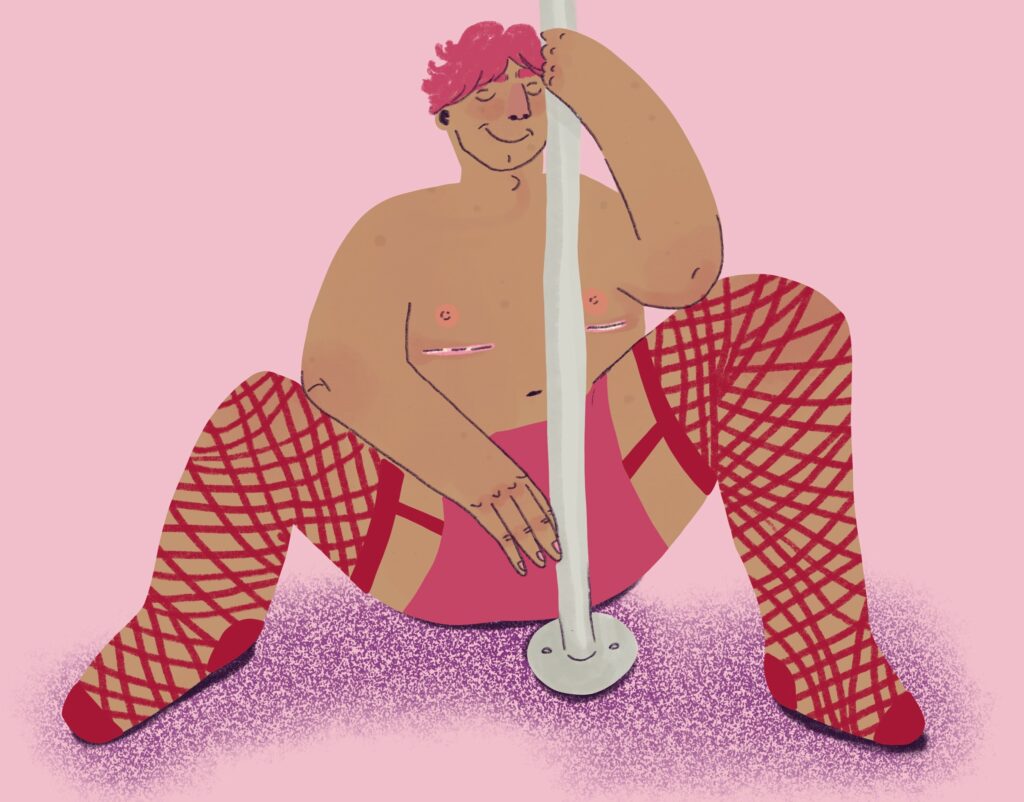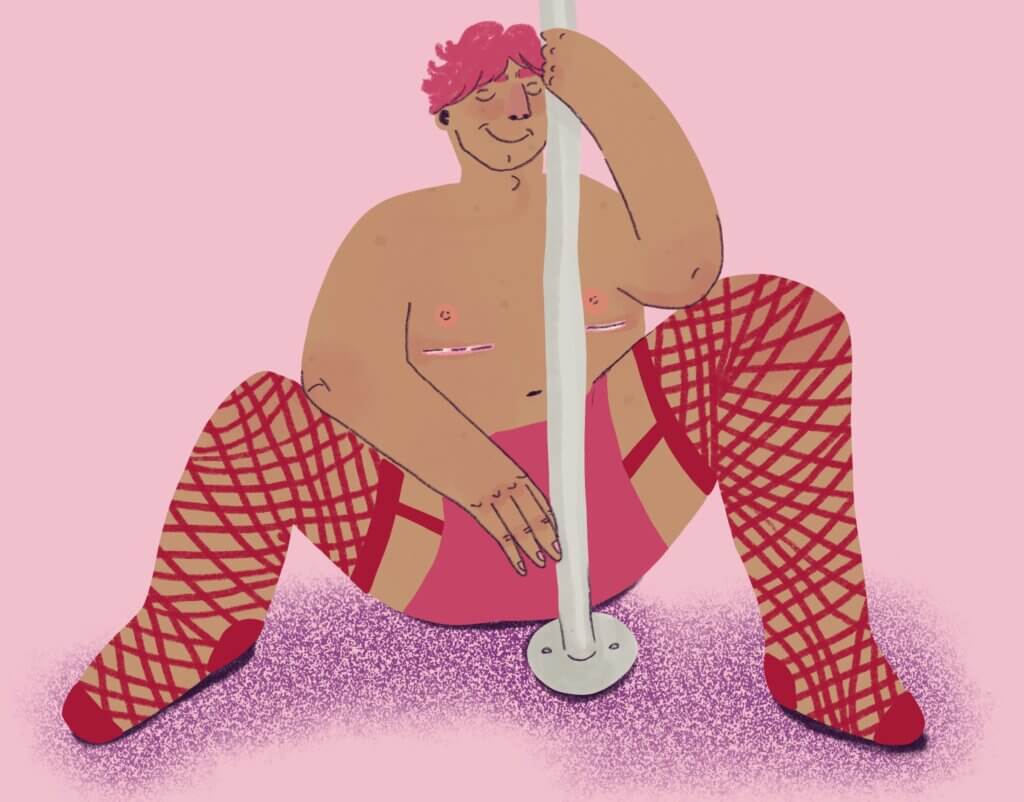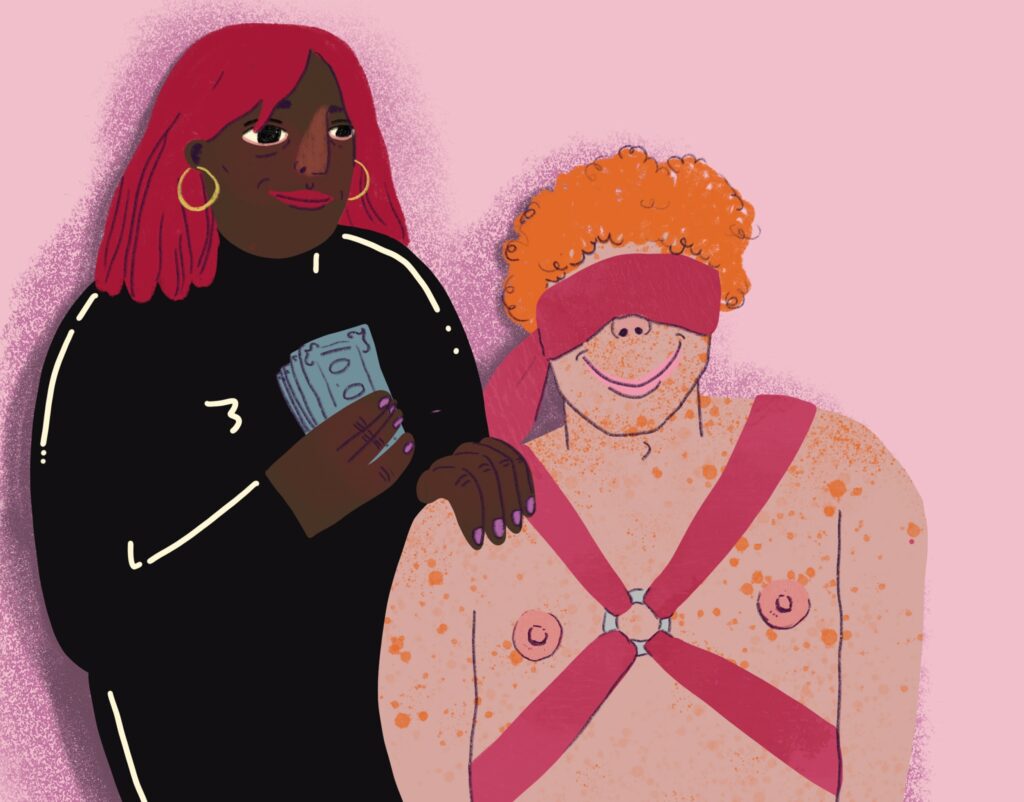Sex Work 101
Author:
Rauða Regnhlífin
@rauda.regnhlifin
facebook.com/raudaregnhlifin
Þýðandi:, Translator:
Tinna Eik Rakelardóttir
Rauða regnhlífin (e. The Red Umbrella), an organization that fights for the safety and rights of sex workers in Iceland write:
What is sex work?
Sex work is an umbrella term that refers to all work where the objective is to give the buyer an erotic or sexual experience.
This category includes:
- People that sell sex indoors (either indepentently or for a brothel/club/agency)
- People that sell sex outdoors/in a car
- People that sell erotic massages
- People that sell images of themselves fully or partially nude
- People that offer BDSM services like pro-sub or pro-dom, for payment
- People that dance naked for payment, either at clubs or online
- People that make porn and sell it online
- People that sell erotic phone calls
- People that act in porn films for porn producers

Is sex work dangerous, and why?
Whn an individual decides to start sex work there are a few issues they need to think about. The level of danger depends on the law, social attitudes and the type of work in question each time. People that sell sex in person are always at the most risk of being subjected to violence, the risk factor goes up if sex is being sold outside. The danger in each field within the industry depends a lot on what law is being followed so we will go over the different models:
Laws on sex work
The Swedish Model
It’s legal to sell sex services, but it’s illegal to advertise, buy or profit from them. It’s also illegal to spread “pornographic” images in magazines for a profit.
People that sell sex in countries where the Swedish model is followed and buying is illegal (like in Iceland) have few options when it comes to safety. People that chose to sell sex in Iceland most often have to work alone. If we for example want to work two or more in one household for safety, or if we want to pay someone to stand guard, then the guard and our co-workers might get charged for profiting from the sex work of others. Clients are also more likely to provide false names or information, which makes it harder for us to press charges when we experience real violence at work. The laws have an even deeper influence on our job and financial security in the way that if the police suspects that we are selling sex, e.g. after we have made a report about violence at work, then the police can stake out our address and harass us in order to arrest clients. Additionally, if the police or our landlords find out that we are selling sex (regardless of us working from home or not), then landlords legally have to terminate our lease and throw us out. If a landlord doesn’t follow that law they can be charged for profiting from sex work. These laws define us as victims with little or no agency and they have done little more for us than just hurting us and swept us under the rug, far out on the margin of society where no one can hear us or see us. Societal attitudes play a big role in the safety of sex workers. Our society has learnt through myths and scare tactics on TV, in books, newspapers and single sided discourse, that we are some sort of sub-humans or simply not even human, and that sex workers shouldn’t be listened to because we must be lying when we say that we have chosen sex work. Another bitter fact about the Swedish model is that it combines sex work and human trafficking, and it does next to nothing to prevent the expulsions of people that have ended up in Iceland as the result of human trafficking, irregardless of their situations.
Then there are other, different risks under the Swedish model, when it comes to the clients. People that sell sex but are homeless or don’t have the option to work indoors, and therefore sell sex on the street or in cars often have very limited time to have a discussion on consent, the service, price and more security issues before they get into a car because clients are afraid to be seen and charged for requesting sexual services. These situations also create a higher likelihood of the clients that end up actually taking the risk and coming to us think there is nothing wrong with breaking the law, which means that those clients are more likely to be dangerous.
Legalization
Itðs legal to sell sex, and buy sex, but people have to register with the government and they have to work in legal workplaces with superiors, otherwise they are selling sex illegally and run the risk of getting arrested.
A few countries have legalised sex work, but there the agency of sex workers is not being respected and the faults are varied. In countries like Australia and the Netherlands it’s the government that decides where, when and how sex work happens and there are strict rules regarding who is allowed to do the work. The consequences are that people that can’t fulfill the governmental standards but still want to work are made out to be criminals in the eyes of the law, for working outside of the legal realms. Immigrant sex workers that don’t have a secure status in the country are especially marginalized in countries that adhere to legalization.

Criminalization
It’s illegal to sell and buy sex services
The criminalisation of sex work, that is the law in around 100 countries all over the world is the most dangerous law regarding sex work, both for sex workers and our clients. Human rights watch has figured out, again and again, with thorough research in many countries that criminalisation multiplies the exposures of sex workers to violence, whether it is rape, robbery, assault or murder.
This kind of violence prevails because the public views sex workers as easy targets that don’t get assistance from the police. Many examples are also in these countries about the police being amongst those that attacks and robs sex workers. For example it is public knowledge amongst sex workers in the US that the police even go as far as raping people in an attempt to provide proof that they are really sex workers. Criminalisation also makes it so that sex workers hesitate to carry condoms because the police and prosecutors have used condoms as evidence for sex work. This causes sex workers to be afraid of carrying condoms, out of fear of arrest, so they are forced to have sex withour protection, which increases the risk of HIV and other STD’s Criminalisation constantly weakens the possibilities that sex workers have to seek justice fro crimes that are commited against us. For example sex workers in South Africa have said that they don’t report armed robbery or rape out of fear of getting arrested, and that their experience of the police is harassment, humiliation and arrests.
De-Criminalization
No special laws, or registration for sex work, sex work is treated like every other job and people can join unions and escape from police monitoring. Human trafficking and everything in regards to slave labour and sexual violence is still illegal under de-criminalization.
Under de-criminalization there are still laws regarding human trafficking and sexual violence. The change is that people that do sex work can do so without any inteventions from the law. The agency of sex workers is respected and no one has to register as a sex worker with the government to be allowed to work in peace. This model is different than others in the way that it was formed in cooperation with sex workers. New Zealand was the first country to implement de-criminalization in 2003 and according to sex workers in the country, it has gone well. In New Zealand it’s legal for all citizens over 18 years old to sell sex services, in any format, place and time. The rights of sex workers are secured with work- and human rights laws. Research has been made about these laws and the results were great. Sex work in New Zealand has not increased since 2003, like many thought would happen. 90% of people in the sex industry felt that they got work-, legal-, health- and security rights and 64% had an easier time saying no to clients. To be able to decline clients is very important because everyone should be in control of their own boundaries. Under criminalization, legalisation and the Swedish model people usually have a harder time saying no to clients. The research also showed that 57% said that the attitudes of police towards sex workers has changed to the better after de-criminalisation, because the emphasis isn’t on “saving” or emprisoning anymore, but it’s rather on listening and respecting their needs and rights.

What is OnlyFans?
OnlyFans is a website where people over 18 years old can have a closed group that they charge others to access. People that upload images, videos, texts and more for fans that want to be updated. Models on the site charge different fees for access. No one price is more correct than others and it’s very varied. OnlyFans has recently gotten a lot of criticism on social media for changing the site in a way where it makes it more difficult for models to get paid (e.g. the top limit on tips per subscriber was lowered, the wait for payout in many countries changed from 7 days to 20+ days). This has caused many models to find and create other sites and apps to use instead.
Why not “prostitution”?
First and foremost the word “prostitution” was made *about* us, not by us. While sex work is a word that we created and we use ourselves. Sex work was first used publicly by the writer of Carol Leigh (Scarlot Harlot) in 1984 because she felt like the words that feminists used at that time objectified people that did sex work. But it wasnðt until 1987 that sex work was seen again publicly, than in the book Sex Work: Writings by Women in the Industry, that was put together by Frédérique Delacoste og Priscilla Alexander.
Do people choose to do sex work?
The reality is that sex work can be beneficial from many points of views and people often gravitate towards sex work instead of caving to pressure and burning out for 2.000ISK per hour. The accessibility threshold is lower because there are no job interviews, no or low qualification standards or job requirements or educational demands, the hours are flexible and the wages are high. It’s difficult and demanding, but in a different way than a 9-5 job, which is exactly the reason for a lot of people with longterm illnesses and people with all kinds of disabilities decide to do sex work.
Illustrations: Alda Lilja
— — —
Reading materials and sources:
www.urevolution.com/disabled-sex-worker-with-a-chronic-illness
www.swarmcollective.org/blog/the-swedish-model
www.sexworkeurope.org/resources/resources-download
www.versobooks.com/books/3039-revolting-prostitutes
www.nswp.org/timeline/event/carol-leigh-coins-the-term-sex-work
https://www.sexworkeurope.org/underserved-overpoliced-invisibilised-lgbt-sex-workers-do-matter
www.nswp.org/sites/nswp.org/files/sg_to_challenging_nordic_model_prf03.pdf
www.nswp.org/sites/nswp.org/files/20_years_of_failing_sex_workers.pdf
www.hrw.org/news/2019/08/07/why-sex-work-should-be-decriminalized
www.amnesty.org/en/qa-policy-to-protect-the-human-rights-of-sex-workers/
Read more about...


